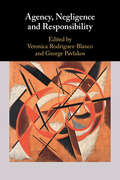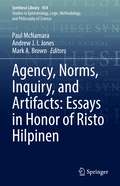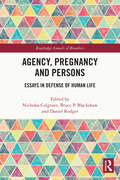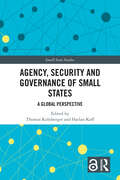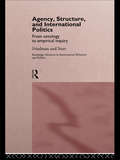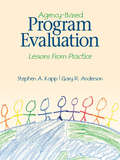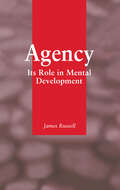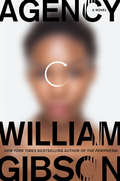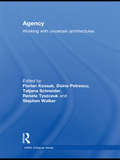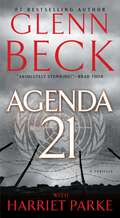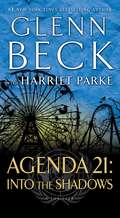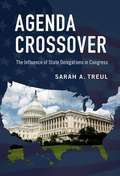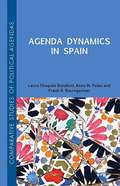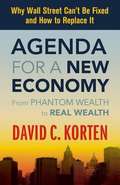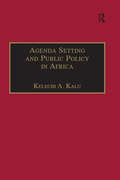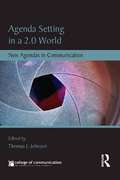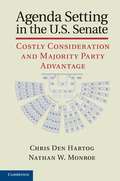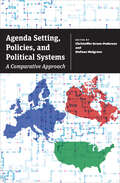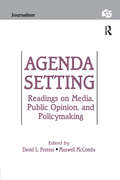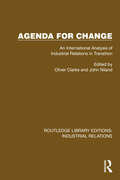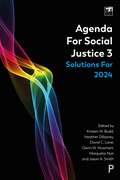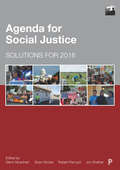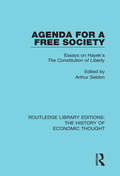- Table View
- List View
Agency, Negligence and Responsibility
by George Pavlakos Veronica Rodriguez-BlancoThis collection of essays represents a ground-breaking collaboration between moral philosophers, action theorists, lawyers and legal theorists to set a fresh research agenda on agency and responsibility in negligence. The complex phenomenon of responsibility in negligence is analysed from multi- and interdisciplinary perspectives, shedding light on key ethical and legal issues related to agency and negligence to impact substantive law and policy-making in different jurisdictions. The volume introduces new debates and questions old assumptions, inviting the reader to rethink substantive law and practical ethical reflection.
Agency, Norms, Inquiry, and Artifacts: Essays in Honor of Risto Hilpinen (Synthese Library #454)
by Mark A. Brown Paul McNamara Andrew J. I. JonesThe book contains a collection of chapters written by experts from the fields of philosophy, law, logic, computer science and artificial intelligence who pay tribute to Professor Risto Hilpinen's impressive work on the logic of induction, on deontic logic and epistemology, and on philosophy of science.In addition to an introduction by the editors, a section on Professor Hilpinen’s positions, professional services and honors, as well as a complete bibliography of his writings, the editors, McNamara, Jones and Brown, have compiled a multidisciplinary global cross-section of academic contemporaries that provides insights and perspectives on Hilpinen's influence and legacy.The essays reflect central aspects of Risto Hilpinen's research interests, and offer further contributions to some of the philosophical fields for which he is best known: applied modal logic, including deontic logic (from the ancient Greek δέον déon, pertaining to the concepts of duty and obligation), the semantics of normative language, the logic of action, and the theory of practical reasoning; the analysis of the concept of artifact; and the theory of semiotics in the tradition of Charles Peirce. The presence in the collection of several papers relating to deontic logic underlines Hilpinen's importance in that area, in which his publications have long been recognized as standard works. The book is an essential collection of ideas for all those who feel at home in a variety of formal disciplines, from propositional logic to the logic of artificial intelligence.
Agency, Partnership, and the LLC: Cases, Materials, Problems (Eighth Abridged Edition)
by J. Dennis Hynes Mark J. LoewensteinThis is a condensed version of the hardbound casebook, designed for use by teachers who have limited time but still want a fairly full exposure to the law. The scope of coverage still includes all unincorporated forms of doing business. While new cases have been added and all materials have been updated, the main changes in this edition deal with partnerships and limited liability companies. Special attention is given to the effect of new or recently amended statutes
Agency, Pregnancy and Persons: Essays in Defense of Human Life (Routledge Annals of Bioethics)
by Nicholas Colgrove Bruce P. Blackshaw Daniel RodgerThis book provides extensive and critical engagement with some of the most recent and compelling arguments favoring abortion choice. It features original essays from leading and emerging philosophers, bioethicists and medical professionals that present philosophically sophisticated and novel arguments against abortion choice. The chapters in this book are divided into three thematic sections. The first set of essays focuses primarily on unborn human individuals—zygotes, embryos and fetuses. In these chapters it is argued, for example, that human organisms begin to exist at conception and that zygotes, embryos and fetuses are persons. These chapters also explore questions about whether or not zygotes, embryos and fetuses are part of their mothers’ bodies. The second set of essays focuses primarily on elective abortion and the debates surrounding it. These chapters consider whether or not opponents of abortion are commonly hypocritical, how opponents of abortion should think about adoption, how emerging technologies may affect the current debate and whether or not those participating in the debate should rely on analogies to support their case. Finally, the third set of essays shifts focus from the legal and moral status of elective abortion to its place in medical practice. In these chapters it is argued that elective abortion embodies a kind of ableism, and that elective abortion is medically unnecessary, harmful to women’s mental health and that telemedicine abortion poses significant risks to women’s health. Agency, Pregnancy and Persons offers an up-to-date examination of unborn human beings, the debates surrounding elective abortion and the place of elective abortion within medical practice. It will be of interest to medical professionals and those who work in philosophy, bioethics and medical ethics alike.
Agency, Security and Governance of Small States: A Global Perspective (Small State Studies)
by Thomas Kolnberger Harlan KoffAgency, Security and Governance of Small States examines what seems to be a defining paradox of Small-State Studies: the simultaneous coexistence (and possible co-dependence) of vulnerability and opportunity related to small-state size. This book analyses small states within the framework of this apparent paradox. Traditionally, Small-State Studies has focused on three guiding questions: what constitutes a ‘small state’? What explains small-state influence in global affairs? Are small states truly vulnerable to security threats given the expansion of multilateralism and regionalism throughout the world? This book contends that new questions should be asked which recognise the important shifts in twenty-first century security paradigms, to better understand how some states deploy their smallness as a resource for agency in supranational contexts. By varying historical, geographical, security, and governance contexts, the book embraces a most-different-cases approach. The historical perspective is often neglected in Small-State Studies but contributes to understanding how small states have often, over time, transformed perceived insecurity into agency. By focusing on different world regions, the authors enable the comparative analysis of collective actions, and the creation and implementation of institutions for ‘common sense purposes’ within a geographical region. Of particular contemporary importance, the book includes contributions which contend with hard-security issues alongside other soft-security challenges. The comparison of case studies confirms that hard-security vulnerability and soft-security opportunities seem to be two sides of the same coin, which reinforces the book’s focus on small-state paradoxes, and raises the question of whether smallness can be considered the defining characteristic of governance in these countries. This book will have a broad appeal because of the different world regions it analyses. It will be of interest to postgraduate students, scholars, and researchers of international relations, security, sustainability, governance, development, and political economy, as well as Small-State Studies. The Chapters 4, 8 and 11 of this book are freely available as downloadable Open Access PDFs at http://www.taylorfrancis.com under a Creative Commons Attribution-Non Commercial-No Derivatives (CC-BY-NC-ND) 4.0 license. The publication of Chapter 4 as Open Access has been made possible by the Institute of History at the University of Luxembourg. The publication of Chapter 8 as Open Access has been made possible by Western Sydney University. The publication of Chapter 11 as Open Access has been made possible by the University of Hamburg.
Agency, Structure and International Politics: From Ontology to Empirical Inquiry (Routledge Advances in International Relations and Global Politics)
by Harvey Starr Gil FriedmanThe concepts of agency and structure are of increasing and defining importance to international relations and politics as fields of enquiry and knowledge. This is the first book to explore the two concepts in depth in that context.The agent-structure problem refers to questions concerning the interrelationship of agency and structure, and to the ways in which explanations of social phenomena integrate and account for them. This is an important contribution to the study of international relations and politics.
Agency-Based Program Evaluation: Lessons From Practice
by Gary R. Anderson Stephen A. KappThis text aids both students and practitioners in articulating the elements of program evaluation, deepening their understanding of the contextual issues that surround and shape an evaluation. Authors Stephen A. Kapp and Gary R. Anderson offer readers details on the application of useful and accepted evaluation methods. It also shows readers how to make sound decisions in balancing techniques and strategies with the realities of the agency environment. Key Features Ethical considerations related to collecting data from service consumers and working with agency personnel Strategies for accommodating cultural and ethnic differences when collecting program evaluation data Techniques for engaging agency personnel and key constituents in the entire evaluation process Accompanied by robust ancillaries This text is accompanied by a robust companion site. The password-protected Instructor′s Site features: Sample Syllabi PowerPoint Slides Test Bank The open-access Student Study Site offers: Quizzes Journal Articles Web Resources and Activities This text is designed for upper-level undergraduate and graduate courses in program evaluation within departments of social work, mental health, and human services. It is also a great resource for practicing professionals, supervisors, and managers.
Agency: Its Role In Mental Development (Essays In Environmental Psychology Ser.)
by James RussellThe idea behind this book is that developing a conception of the physical world and a conception of mind is impossible without the exercise of agency, meaning "the power to alter at will one's perceptual inputs". The thesis is derived from a philosphical account of the role of agency in knowledge.; The book is divided into three parts. In Part One, the author argues that "purely representational" theories of mind and of mental development have been overvalued, thereby clearing the ground for the book's central thesis. In Part Two, he proposes that, because objective experience depends upon the experience of agency, the development of the "object concept" in human infants is grounded in the development of executive-attentional capacities. In Part Three, an analysis of the links between agency and self-awareness generates an original theory of the nature of certain stage-like transitions in mental functioning and of the relationship between executive and mentalizing defects in autism.; The book should be of interest to students and researchers in cognitive- developmental psychology, to philosophers of mind, and to anybody with an interest in cognitive science.
Agency: Public Agencies Under Fire (Urban Affairs Annual Reviews #15)
by William GibsonWilliam Gibson has trained his eye on the future for decades, ever since coining the term “cyberspace” and then popularizing it in his classic speculative novel Neuromancer in the early 1980s. Cory Doctorow raved that The Peripheral is “spectacular, a piece of trenchant, far-future speculation that features all the eyeball kicks of Neuromancer.” Now Gibson is back with Agency—a science fiction thriller heavily influenced by our most current events. <p><p> Verity Jane, gifted app whisperer, takes a job as the beta tester for a new product: a digital assistant, accessed through a pair of ordinary-looking glasses. “Eunice,” the disarmingly human AI in the glasses, manifests a face, a fragmentary past, and a canny grasp of combat strategy. Realizing that her cryptic new employers don’t yet know how powerful and valuable Eunice is, Verity instinctively decides that it’s best they don’t. <p> Meanwhile, a century ahead in London, in a different time line entirely, Wilf Netherton works amid plutocrats and plunderers, survivors of the slow and steady apocalypse known as the jackpot. His boss, the enigmatic Ainsley Lowbeer, can look into alternate pasts and nudge their ultimate directions. Verity and Eunice are her current project. Wilf can see what Verity and Eunice can’t: their own version of the jackpot, just around the corner, and the roles they both may play in it. <p> <b>A New York Times Bestseller</b>
Agency: Working With Uncertain Architectures
by Stephen Walker Doina Petrescu Tatjana Schneider Renata Tyszczuk Florian KossakWhile the potential of agency is most frequently taken to be the power and freedom to act for oneself, for the architectural community this also involves the power and responsibility to act as intermediaries on behalf of others. Presenting current thinking from practitioners and scholars from around the world, this book asks for a more active relationship between the humanities, the architectural profession, and society. Considering issues of architectural research as an agency of transformation, this book explores how humanities research can better contribute towards understanding current architectural needs.
Agenda 21
by Glenn Beck Harriet Parke"I was just a baby when we were relocated and I don't remember much. Everybody has that black hole at the beginning of their life. That time you can't remember. Your first step. Your first taste of table food. My real memories begin in our assigned living area in Compound 14." Just a generation ago, this place was called America. Now, after the worldwide implementation of a UN-led program called Agenda 21, it's simply known as "the Republic." There is no president. No Congress. No Supreme Court. No freedom. There are only the Authorities. Citizens have two primary goals in the new Republic: to create clean energy and to create new human life. Those who cannot do either are of no use to society. This bleak and barren existence is all that eighteen-year-old Emmeline has ever known. She dutifully walks her energy board daily and accepts all male pairings assigned to her by the Authorities. Like most citizens, she keeps her head down and her eyes closed. Until the day they come for her mother. "You save what you think you're going to lose." Woken up to the harsh reality of her life and her family's future inside the Republic, Emmeline begins to search for the truth. Why are all citizens confined to ubiquitous concrete living spaces? Why are Compounds guarded by Gatekeepers who track all movements? Why are food, water and energy rationed so strictly? And, most important, why are babies taken from their mothers at birth? As Emmeline begins to understand the true objectives of Agenda 21 she realizes that she is up against far more than she ever thought. With the Authorities closing in, and nowhere to run, Emmeline embarks on an audacious plan to save her family and expose the Republic--but is she already too late?
Agenda 21: Into The Shadows
by Glenn BeckThe sequel to Agenda 21, from #1 New York Times bestselling author and nationally syndicated radio host Glenn Beck."I knew those men were our enemies, but they, like everyone else in the Republic, were nothing more than servants. Rule followers. They had no choice. But I did. I had a choice and I made it. I knew then and there that, no matter what happened, I would never go back. Never." It was once named America, but now it is just "the Republic." Following the worldwide implementation of a UN-led program called Agenda 21, the once-proud people of America have become obedient residents who live in barren, brutal Compounds and serve the autocratic, merciless Authorities. Citizens mainly keep their heads down and their mouths shut--but Emmeline is different. When the Authorities took her mother away, she started questioning the world around her. What happened to her mom? Why is everyone confined to grim living spaces and made to eat the same food cubes every day? Why was her own baby taken from her to be raised in the Children's Village? And are the rumors that somewhere out beyond the fence live those who got away during the Relocations--the so-called shadow people--really true? When Emmeline's questions lead to the realization that she will never see her child again, she decides to escape the Compound with her partner, David, and their baby, Elsa. Fleeing the armed enforcers of the Earth Protection Agency, and facing the unknown for the first time in their lives, Emmeline and David run into the shadows in the desperate hope of finding something they'd only heard stories about from those who'd lived before the Relocations: freedom.
Agenda Crossover: The Influence of State Delegations in Congress
by Sarah A. TreulAgenda Crossover updates our understanding of state delegations, exploring how they influence representation and responsiveness in Congress today. The theory of agenda crossover posits that members of the House and Senate have much to gain from monitoring the legislative agendas of other members of the delegation, especially those in the opposite chamber. Treul clearly demonstrates that individual members of delegations still utilize their fellow delegates in order to help them respond to constituents and enhance their own electoral success. It is argued that on certain issues - particularly the ones most relevant to a state's economy - members of Congress are willing to set aside partisan differences and work across the aisle. In this way, these bicameral connections between members of a state delegation - even across party lines - can, at times, trump the power of party in Congress. Proposes a new way to analyze state delegations in Congress for those who study Congress, states, representation, and law-making Connects the House of Representatives to the Senate, offering a unique approach to studying representation across legislative chambers Assesses state delegations over time, which will appeal to those interested in institutional development
Agenda Dynamics in Spain (Comparative Studies of Political Agendas)
by Frank R. Baumgartner Laura Chaqués-Bonafont Anna M. PalauSpanish politics has been transformed. Using new techniques, this book looks at 30 years of Spanish political history to understand party competition, the impact of the EU, media-government relations, aspirations for independence in Catalonia and the Basque region, and the declining role of religion.
Agenda For a New Economy: Why Wall Street Can't Be Fixed and How to Replace It
by David C. KortenDavid Korten shows, the steps being taken to address it-including pouring trillions of dollars into bailouts for the Wall Street institutions that created the mess-do nothing to deal with the reality of a failed economic system.
Agenda Setting and Public Policy in Africa (Contemporary Perspectives on Developing Societies)
by Kelechi A. KaluAgenda Setting and Public Policy in Africa examines how decision makers have managed and mismanaged public policy issues in sub-Saharan Africa. It analyses the neglected issue of how ideas about public policy are generated, by whom and for what purpose. Persistent problems such as political instability, environmental pollution, famine, hunger, desertification, rent-seeking and incessant intra-conflicts across the continent are explored in a systematic and structured manner. Each contributor proffers convincing solutions to clearly identified problems. Well-researched and solution orientated, this book will engage scholars and policy makers who are interested in public policy and development issues in Africa.
Agenda Setting in a 2.0 World: New Agendas in Communication (New Agendas in Communication Series)
by Thomas J. JohnsonThis volume explores agenda-setting theory in light of changes in the media environment in the 21st century. In the decades since the original Chapel Hill study that launched agenda-setting research, the theory has attracted the interest of scholars worldwide. Agenda Setting in a 2.0 World features the work of a new generation of scholars. The research provided by these young scholars reflects two broad contemporary trends in agenda-setting: A centrifugal trend of research in the expanding media landscape and in domains beyond the original focus on public affairs, and a centripetal trend further explicating agenda-setting’s core concepts.
Agenda Setting in the U.S. Senate
by Chris Den Hartog Nathan W. MonroeProposes a new theory of Senate agenda setting that reconciles a divide in literature between the conventional wisdom - in which party power is thought to be mostly undermined by Senate procedures and norms - and the apparent partisan bias in Senate decisions noted in recent empirical studies. Chris Den Hartog and Nathan W. Monroe's theory revolves around a 'costly consideration' framework for thinking about agenda setting, where moving proposals forward through the legislative process is seen as requiring scarce resources. To establish that the majority party pays lower agenda consideration costs through various procedural advantages, the book features a number of chapters examining partisan influence at several stages of the legislative process, including committee reports, filibusters and cloture, floor scheduling and floor amendments. Not only do the results support the book's theoretical assumption and key hypotheses, but they shed new light on virtually every major step in the Senate's legislative process.
Agenda Setting, Policies, and Political Systems: A Comparative Approach
by Bryan D. Jones Peter John Sylvain Brouard Martial Foucault Éric Montpetit Frédéric Varone Will Jennings Shaun Bevan Isabelle Engeli Pascal Sciarini Anne Hardy Laura Chaqués-Bonafont Anna M. Palau Emiliano Grossman Arco Timmermans Isabelle Guinaudeau Christian Breunig Michelle C. Whyman Gerard Breeman Roy Gava Brandon Zicha Jeroen Joly Tobias Van Assche Enrico Borghetto Marcello Carammia Francesco Zucchini Luz M. Muñoz MarquezWhat will gain the system&’s attention? &“Explores the dynamics of a broad range of policy issues in different countries . . . an important scholarly contribution.&” —Political Studies Review Before making significant policy decisions, political actors and parties must first craft an agenda designed to place certain issues at the center of political attention. The agenda-setting approach in political science holds that the amount of attention devoted by the various actors within a political system to issues like immigration, health care, and the economy can inform our understanding of its basic patterns and processes. While there has been considerable attention to how political systems process issues in the United States, Christoffer Green-Pedersen and Stefaan Walgrave demonstrate the broader applicability of this approach by extending it to other countries and their political systems. This book brings together essays on eleven countries and two broad themes. Contributors to the first section analyze the extent to which party and electoral changes and shifts in the partisan composition of government have led—or not led—to policy changes in the United States, the United Kingdom, the Netherlands, Denmark, Switzerland, and France. The second section turns the focus on changing institutional structures in Germany, Italy, Belgium, Spain, and Canada, including the German reunification and the collapse of the Italian party system. Together, the essays make clear the efficacy of the agenda-setting approach for understanding not only how policies evolve, but also how political systems function.
Agenda Setting: Readings on Media, Public Opinion, and Policymaking (Routledge Communication Series)
by Maxwell McCombs David L. ProtessThe role of the news media in defining the important issues of the day, also known as the agenda-setting influence of mass communication, has received widespread attention over the past 20 years. Since the publication of McCombs and Shaw's seminal empirical study, more than one hundred journal articles and monographs have appeared. This collection exemplifies the major phases of research on agenda-setting: tests of the basic hypothesis, contingent conditions affecting the strength of this influence, the natural history of public issues, mass media influence on public policy, and the role of external sources from the president to public relations staffs on the news agenda.
Agenda for Change: An International Analysis of Industrial Relations in Transition (Routledge Library Editions: Industrial Relations)
by Oliver Clarke John NilandAgenda for Change (1991) examines the experiences of five industrialised market economies in a period of profound change in industrial relations. It looks at the national history and culture affecting industrial relations, the obstacles to change and the levers that could effect it, and the respective roles of employers, unions and governments in bringing about improvement. Is there any single model of an industrial relations system to which a country could aspire?
Agenda for Management Innovation
by Gary Hamel Bill BreenIn this chapter, the author identifies some roadblocks to innovation, and suggests that in order to maximize the chances for precedent-breaking management innovation, managers should devote themselves to a problem that is consequential and inspiring, essential and laudable. This chapter was originally published as chapter 3 of "The Future of Management."
Agenda for Social Justice 3: Solutions for 2024 (SSSP Agendas for Social Justice)
by Sophie Webb Teresa A. Sullivan Dana Johnson Blake R. Silver Katie Kerstetter Gabriela Gonzalez Ashley C. Rondini Ashley N. Gwathney Brooke Cordes Charity Anderson Drew Bonner Elroi Windsor Hayley Carlisle Jeanne Kimpel Kristen Burke Lance Hannon Lindsay Redditt McKenzie Berezin Meredith Van Natta Monique Harrison Nazgol Ghandnoosh Raquel Rose Sarah Jane Brubaker Sydney Ingel Tiffany Joseph Tony Samara Mary BernsteinThe Agenda for Social Justice 3: Solutions for 2024 provides accessible insights into some of the most pressing social problems and proposes public policy responses to those problems. Written by a highly respected team of authors brought together by the Society for the Study of Social Problems (SSSP), the book offers recommendations for action by elected officials, policymakers and the public regarding key issues for social justice. Chapters include discussion of social problems related to criminal justice, the economy, food insecurity, education, healthcare, housing and immigration. The book will be of interest to scholars, practitioners, advocates and students interested in public sociology, the study of social problems and the pursuit of social justice.
Agenda for Social Justice: Solutions for 2016 (SSSP Agendas for Social Justice)
by Glenn W. Muschert, Brian V. Klocke, Robert Perrucci, and Jon ShefnerThe Agenda for Social Justice: Solutions for 2016 provides accessible insights into some of the most pressing social problems in the United States and proposes public policy responses to those problems. Written by a highly respected team of authors brought together by the Society for the Study of Social Problems (SSSP), it offers recommendations for action by elected officials, policy makers, and the public around key issues for social justice, including a discussion of the role of key issues of sustainability and technology in the development and timbre of future social problems. It will be of interest to scholars, practitioners, advocates, and students interested in public sociology and the study of social problems.
Agenda for a Free Society: Essays on Hayek's The Constitution of Liberty (Routledge Library Editions: The History of Economic Thought #11)
by Arthur SeldonIn this book, first published in 1961, under the general editorship of Arthur Seldon of the Institute of Economic Affairs, ten eminent writers, economists, philosophers, and a legal authority have set down their views on the principles and policies of a free society in a rapidly changing world. Each has developed his theme from the same material – Professor F. A. Hayek’s monumental work The Constitution of Liberty. This title will be of interest to students of history and economics.
